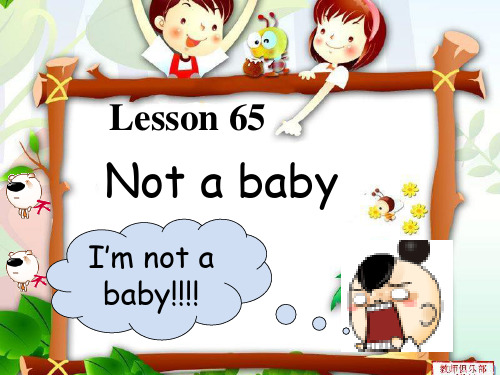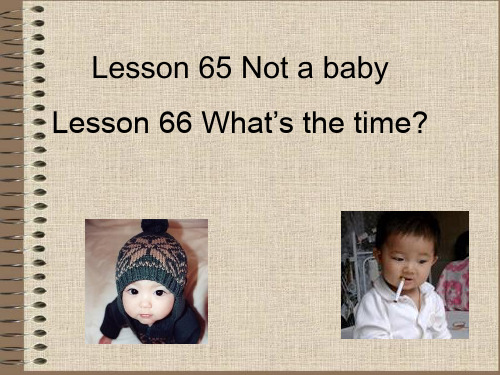新概念英语第一册第65-66课课件
合集下载
新概念第一册L65、66课PPT.

单词 闯天下
enjoy mum Dad key baby hear
Dad -------Mom
• dad和mum前如没有所有格代词或名词所有
• • • • father, daddy, dad, pa, papa mother , mom, mama, mummy Tom's dad is a worker. Can you buy me a gift, Dad?
玩得开心,玩得高兴
• 不可以加动词原形,而要加V-ing 的动词
• enjoy, mind, finish, avoid,like • Would you mind turning down your radio a little, please?
• 你把收音机音量调小一点,好吗?
苏醒,恢复意识 come to oneself He came to himself last night . 为了某人自己 for oneself We made a bookcase for ourselves .
第十条父母或者其他监护人应当以健康的思想品行和适当的方法教育未成年人引导未成年人进行有益身心健康的活动预防和制止未成年人吸烟酗酒流浪以及聚赌吸毒卖淫
Lesson 65
Not a baby
I’m not a baby!!!!
New words
hear enjoy key ourselves mum dad yourself baby
yourself!
JILL: We always enjoy ourselves , Mum.
Bye-bye.
• 1.What are you going to do this evening, Jill? • 由every, this, next等词开头的时间状语前面通 常不加介词。 2.Jill's eighteen years old, Tom. 表示“几岁”,一般由基数词+ year(s) old构 成。在口语中,year(s)old往往可以省去,而 只用数字表示年龄。 She is eighteen.
新概念英语第一册 Lesson65-66(带答案)(共28张PPT)

» 介词in的使用:
年:____in_2_0_1_5_______ 在2015年 月:____in__M_a_y______ 在五月
季节:__i_n_S_p_r_in_g_____ 在春天
上午/下午/晚上: _in__th_e__m_o_rn_i_n_g/_a_f_t_er_n_o_o_n_/e_v_e_n_in_g__
他 相 关 指 标 也实现 了益增 则增,益 降则降 的效果 ,都优 于去年 水平。 二 、 招 商 引 资与项 目建设
由 于 我 们 过 去过高 地估计 了自己 的实力 ,在招商 引资方
(2) key n. 钥匙,答案 e.g. 表示_钥__匙__:Can you give me the key _t_o__
» 试一试: Neil is asking Yoyo about what she usually does.
What do you usually do __i_n_ spring?
__I__u_s_u_a_ll_y_g_o__t_o_f_l_y_a__k_it_e__in_ spring. (放
_t_h_e_m__+__se_l_ve_s___t_h_e_m_s_e_lv_e_s他/她们自己
注意:
单数人称代词的反身代词在后加___s_e_lf___; 复数人称的反身代词在后加__s_e_l_ve_s____
反身代词的用法
1. 当宾语和主语是同一人时,一般需要用反身代词 e.g. __Y_o_u_ can see _y_o_u_r_s_el_f_ in the mirror.
风筝)
What do you usually do ___o_n_ October
1st?
新概念第一册NCE1_lesson65-66(共20页)课件

No , she doesn't have to .
1/17/2020
1. I _c_a_n__ty_p_e___this letter. 2. I _m__u_s_t _st_a_y__at home. 3. She __c_a_n_’_t_g_o____to school yet. 4. We _m_u_s_t_n_’_t_p_l_a_y___with matches. 5. _C_a_n___ you _si_n_g___ a song? 6._M__u_s_t _ hec_o_m__e__ home early?
1/17/2020
• come home 回家 [谈及回家] • be home 在家 • go home 回家 [在外] • get home 到家 [不论在家与否] • arrive home 到家 [比较正式]
1/17/2020
• give sb.sth/give sth. to sb.
eg.Give her the key. =Give the key to her. Give me that book. =Give that book to me. Give him the coat. =Give the coat to him.
1/17/2020
反身代词
• 当宾语和主语是同一个人时,一般需要用反身代词。 • 反身代词有:myself,herself,himself,
yourself ,ourselves,yourselves,themselves • The old lady is talking to herself. • 这个老妇人在自言自语。 • 反身代词也可与名词连用,表达“就是那个人而不
1/17/2020
1/17/2020
1. I _c_a_n__ty_p_e___this letter. 2. I _m__u_s_t _st_a_y__at home. 3. She __c_a_n_’_t_g_o____to school yet. 4. We _m_u_s_t_n_’_t_p_l_a_y___with matches. 5. _C_a_n___ you _si_n_g___ a song? 6._M__u_s_t _ hec_o_m__e__ home early?
1/17/2020
• come home 回家 [谈及回家] • be home 在家 • go home 回家 [在外] • get home 到家 [不论在家与否] • arrive home 到家 [比较正式]
1/17/2020
• give sb.sth/give sth. to sb.
eg.Give her the key. =Give the key to her. Give me that book. =Give that book to me. Give him the coat. =Give the coat to him.
1/17/2020
反身代词
• 当宾语和主语是同一个人时,一般需要用反身代词。 • 反身代词有:myself,herself,himself,
yourself ,ourselves,yourselves,themselves • The old lady is talking to herself. • 这个老妇人在自言自语。 • 反身代词也可与名词连用,表达“就是那个人而不
1/17/2020
新概念英语NCE1_lesson65-66(共51页)课件

pron. 我自己 pron. 你自己 pron. 他自己 pron. 她自己 pron. 我们自己 pron. 他们自己
I hear Mary __pl_ay_ing__(play) the paino.
hear sb to do sth. 听见某人 做某事,表示听见的是某人
经常做的事 hear from 收到某人的来信
14 读作:three fourteen
He must arrive here at 1:45. He must telephone you at 3:20
ourselves
herself
himself yourself myself
at half past three in the morning at five forty in the morning.
FATHER: Oh, all right!
Unit 33
FATHER: Here you are.But you mustn't
come home after a quarter past
eleven. Do you hear?
JILL: Yes. Dad.
JILL: Thanks, Mum.
Lesson 65 Not a baby Lesson 66 What’s the time?
Does Jill’s father give the key to her?
Yes, he does.
• Not a baby
Unit 33
• FATHER: What are you going to do this evening. Jill?
都二
能分
运浇
用灌
新概念英语第一册65课-66课 PPT

F: What are you going to F: You mustn’t come
do this evening, Jill?
home late.
J: I’m going to meet
You must be home at
some friends,Dad.
half past ten.
J: I can’t get home so
Listen again then answer these questions. 4. Does her father want to give her the key?
No, he doesn’t. 5.When must Jill get home? She must get home before a quarter past eleven. 6. Do she and her friends always enjoy themselves? Yes, they do.
early.
F: Oh, all right.
Can I have the key to the front door, please? the key to the exercises/ the answer to the question give her the key Give sb sth/ give sth to sb.
She always comes home early. I always have eggs and milk for breakfast. Tom is always late for school. Mary is always ready to help others.
The important points
新概念一册L65-66PPT课件

8. mum
n. 妈妈
.
14
1.key
1) n. 钥匙
the key to
… 的钥匙
eg.Which is the key to the front door? 前门的钥匙是哪一把?
2) n. 题解,答案,秘诀
the key to the problem 解决这个问题的办法
a key to success 成功的秘诀
.
20
常见反身代词短语: by oneself 独自一人,靠自己 enjoy oneself 玩得开心 hurt oneself 伤到自己 help oneself (to )自便 teach oneself=learn...by oneself 自学 dress oneself 自己穿衣服
.
21
JILL:
Thanks, Mum.
MOTHER: That's all right. Goodbye.Enjoy yourself!
JILL:
We always enjoy ourselves, Mum. Bye-bye.
.
31
知识点小结
7.at half past ten 在十点半 8.get home so early 到家很早
JILL:
I can't get home so early, Dad!
JILL:
Can I have the key to the front door please?
FATHER: No, you can't.
MOTHER: Jill's eighteen years old, Tom. She's not a baby. Give her the key.
最新新概念第一册65-66课课件PPT课件

这边的key是钥匙,它 还可做答案如:key to
exercises
Father:No,you can’t .
Jill is an eighteen-year-old
girl
Mother:Jill’s eighteen years
old ,Tom.She’s not a baby .Give her the 问对方的年龄可
It’s time to watch.
We have a good time! We enjoy ourselves.
I have a good time! You have a good time! They have a good time!
themselves
himself herself
5.半小时以后用to
2:40 twenty to three 4:50 ten to five
• 1:58 two to two • 3:55 five to four • 9:35 twenty-five to ten
--What’s the time? --What time is it? --It’s …
myself yourself yourselves
He has a good time! She has a good time! You all have a good time!
Learn the text
How old are you? Do you have any friends? Do you often meet your friends? Can you get home at 8’clock? Do you always come home early? When must you come home?
新概念英语NCE1_lesson65-66(共33页)课件

4
Questions to Ask
1, Is Jill going to stay at home this evening? 2,What is Jill going to do? 3,When must she come home? 4,Can she get home at half past ten? 5,What does she want to do?
新概念英语第一 册学习讲义
学习步骤: 1,新单词学习 2,课文的讲解以及阅读 3,现场演示 4,问答环节 5,关键知识点的讲解
Lesson 65 Not A Baby
© 2010 E.I. du Pont de Nemours and Company. All Rights Reserved.
2
© 2010 E.I. du Pont de Nemours and Company. All Rights Reserved.
5
•9、阅读使人充实,会谈使人敏捷,写作与笔记使人精确……史鉴使人明智;诗歌使人巧慧2021/9/252021/9/25Saturday, September 25, 2021 •10、每一本书是一级小阶梯,我每爬上一级,就更脱离畜生而上升到人类,更接近美好生活的观念,更热爱书籍。2021/9/252021/9/252021/9/259/25/2021 9:26:26 PM •11、书是人类进步的阶梯,终生的伴侣,最诚挚的朋友。2021/9/252021/9/252021/9/25Sep-2125-Sep-21 •12、阅读一本不适合自己阅读的书,比不阅读还要坏。我们必须会这样一种本领,选择最有价值、最适合自己所需要的读物。2021/9/252021/9/252021/9/25Saturday, September 25, 2021 13、He who seize the right moment, is the right man.谁把握机遇,谁就心想事成。2021/9/252021/9/252021/9/252021/9/259/25/2021 •14、谁要是自己还没有发展培养和教育好,他就不能发展培养和教育别人。2021年9月25日星期六2021/9/252021/9/252021/9/25 •15、一个爱书的人,他必定不致缺少一个忠实的朋友,一个良好的老师,一个可爱的伴侣,一个优婉的安慰者。2021年9月2021/9/252021/9/252021/9/259/25/2021 •16、提出一个问题往往比解决一个更重要。因为解决问题也许仅是一个数学上或实验上的技能而已,而提出新的问题,却需要有创造性的想像力,而且标志着科学的真正进步。 2021/9/252021/9/25September 25, 2021 •17、看文字须大段精彩看,耸起精神,竖起筋骨,不要困,如有刀剑在后一般。就一段中须要透;击其首则尾应,击其尾则首应,方始是。不可按册子便在,掩了册子便忘。 2021/9/252021/9/252021/9/252021/9/25
新概念一LESSON 65-66课件

• FATHER: Here you are. e home after a quarter past eleven. Do you hear? JILL: Yes. Dad.
• JILL: Thanks, Mum. MOTHER: That's all right. Goodbye. Enjoy yourself! JILL: We always enjoy ourselves, Mum. Bye-bye.
Lesson 65
Not a baby
I’m not a baby!!!!
hear enjoy dad key baby ourselves yourself mum
A:What are you going to do tomorrow evening? B:I’m going to meet some friends. Can I have the key to the front door,please? You must come home early. You mustn’t come home after 10:00.
★Dad dad和mum前如没有所有格代词或名词所有 格作修饰语,就特指自己的父母亲,要大 写。 翻译: Can you buy me a gift, Dad?
★ get home arrive home ★ give
sb. Sth. 动词,介词后+宾格人称代词 sth. to sb. 当某物是代词,只用此结构 Give her the key. Give the key to her. Give me an apple. Give an apple to me. Give it to me.
Lesson 66
新概念第一册Lesson65-66(共49张PPT)

★enjoy v. 玩得快活;乐于,喜爱;享受 • enjoy+ 反身代词:玩得高兴 She enjoyed herself in the vacation. • enjoy+ n.(物体) 喜欢…… I enjoyed that meal. • enjoy doing sth. 喜欢做某事 We enjoyed driving along the new highway. We all enjoy our legal rights.
• • • • • • •
I— you— it-she— he— we— they--
人称代词 数 人称 主格 宾格
物主代词 所有格, 名词性 形容性 物主代 物主代 词 词 my your mine yours
反身代词
单 第一人称 人称代词表格 数 第二人称
我 你
I you
me you
myself yourself
• must三大句子 • I must go home.(肯定句) • I must not go home.(否定句) • Must I go home?(疑问句) Yes, you must./No, you mustn’t.(不可 以) No, you needn’t.(不必 )
must stay Can… sing can type Must... come can’t go mustn’t play
第三人称
他
她 它
he
she it we
him
her it us
his
her its our
his
hers its ours
himself
herself itself Ourselv es [,au?'sel
- 1、下载文档前请自行甄别文档内容的完整性,平台不提供额外的编辑、内容补充、找答案等附加服务。
- 2、"仅部分预览"的文档,不可在线预览部分如存在完整性等问题,可反馈申请退款(可完整预览的文档不适用该条件!)。
- 3、如文档侵犯您的权益,请联系客服反馈,我们会尽快为您处理(人工客服工作时间:9:00-18:30)。
key words 关键的话语(词) key point 关键点
★hear v. 听见
• ① v. 听见 Eg: Can you hear me? 你能听到吗?
Do you hear? 你听见了吗? • ② v. 倾听,认真听 Eg: We’d better hear what he has to say. • hear from sb. 收到某人的来信 Eg: I hear from my mother every week. • hear of 听说 • listen 听,正在听 • listen to… Eg: He listened but could hear nothing. • listening 听力
•dad和mum前如没有所有格代词或名词所有格作修饰语,就特指自己的父母亲,要大 写。father和mother也是如此。
Can I have the key to the front door, please? No, you can’t.
To the front door是介词短语,作定语,修饰key .
★enjoy v. 玩得快活
• ① v. 过得快活 • enjoy+ 反身代词:玩得高兴 Eg: She enjoyed herself in the vacation. • ② v. 乐于;喜爱 • enjoy+ n.(物体) 喜欢…… Eg: I enjoyed that meal. • enjoy+ Ving+ sth. 喜欢做某事 • ③ v. 享有,享受 Eg: We all enjoy our legal rights.
Jill’s eighteen years old, Tom. She’s not a baby. Give her the key. She always comes home early. Oh, all right.
表示“几岁”,一般由基数词+ year(s) old构成。在 口语中,year(s)old往往可以省去,而只用数字表示
What are you going to do this meet some friends.
•由every, this, next等词开头的时间状语前面通常不加介词。
You mustn’t come home late. You must be home at half past ten . I can’t get home so early, Dad.
年龄. 如:She is eighteen . 当别人表示感谢时,可以作出如是回答。还可以说
You’re welcome/Not at all/Don’t mention it。
Here you are. But you mustn’t come home after a quarter past eleven. Do you hear? Yes, Dad.
Lesson 65 Not a baby
Vocabulary
dad n.爸爸
mum n.妈妈
key n.钥匙
baby n.婴儿
hear v.听见
enjoy yourself
v.玩的快活 pron. 你自己
★ key n. 钥匙 adj.关键的
the key to the door the key to the front door 前门的钥匙
• She is going to meet some friends. • 2. Must she get home at half past ten? • Yes, she must. • 3. How old is Jill? • She is eighteen. • 4. Does her father want to give her the key? • No, he doesn’t. • 5.When must Jill get home? • She must get home before a quarter past eleven. • 6. Do she and her friends always enjoy themselves? • Yes, they do.
Grammar in use
be going to
• 表示“打算要去做某事” • 一般将来时
• What are you going to do? • I’m going to have my lunch.
You mustn’t come home last. 回家 [强调动作]
You must be home at half past ten. 在家(强调状态)
Thanks, Mum. That’s all right. Goodbye. Enjoy yourself! We always enjoy ourselves, Mum. Bye-bye.
非正式的告别语,语气较随便。非正式的告别语 还有 So long, See you或 Ill be seeing you等。 正式的告别语是 Goodbye,而夜里向人告别时 用 Good night。
I can’t get home so early get home 到家 [不论在家与否]
时 间 表 达 法
日期的表达:
• 通常使用介词on表示星期几(on Monday)、一天中的某段时间(on Monday morning)、日期(on April 1st )、星期几+日期(on Monday, April 1st )、具体时间(on that day)、周年纪 念日(on your birthday)以及节日(on Christmas Day)等。
★yourself pron.你自己
• selfish adj. 自私的 • selfishness n. 自私 • self-centered adj.
自我为中心的
Let's listen to the tape and
answer! • 1. What is Jill going to do?
★hear v. 听见
• ① v. 听见 Eg: Can you hear me? 你能听到吗?
Do you hear? 你听见了吗? • ② v. 倾听,认真听 Eg: We’d better hear what he has to say. • hear from sb. 收到某人的来信 Eg: I hear from my mother every week. • hear of 听说 • listen 听,正在听 • listen to… Eg: He listened but could hear nothing. • listening 听力
•dad和mum前如没有所有格代词或名词所有格作修饰语,就特指自己的父母亲,要大 写。father和mother也是如此。
Can I have the key to the front door, please? No, you can’t.
To the front door是介词短语,作定语,修饰key .
★enjoy v. 玩得快活
• ① v. 过得快活 • enjoy+ 反身代词:玩得高兴 Eg: She enjoyed herself in the vacation. • ② v. 乐于;喜爱 • enjoy+ n.(物体) 喜欢…… Eg: I enjoyed that meal. • enjoy+ Ving+ sth. 喜欢做某事 • ③ v. 享有,享受 Eg: We all enjoy our legal rights.
Jill’s eighteen years old, Tom. She’s not a baby. Give her the key. She always comes home early. Oh, all right.
表示“几岁”,一般由基数词+ year(s) old构成。在 口语中,year(s)old往往可以省去,而只用数字表示
What are you going to do this meet some friends.
•由every, this, next等词开头的时间状语前面通常不加介词。
You mustn’t come home late. You must be home at half past ten . I can’t get home so early, Dad.
年龄. 如:She is eighteen . 当别人表示感谢时,可以作出如是回答。还可以说
You’re welcome/Not at all/Don’t mention it。
Here you are. But you mustn’t come home after a quarter past eleven. Do you hear? Yes, Dad.
Lesson 65 Not a baby
Vocabulary
dad n.爸爸
mum n.妈妈
key n.钥匙
baby n.婴儿
hear v.听见
enjoy yourself
v.玩的快活 pron. 你自己
★ key n. 钥匙 adj.关键的
the key to the door the key to the front door 前门的钥匙
• She is going to meet some friends. • 2. Must she get home at half past ten? • Yes, she must. • 3. How old is Jill? • She is eighteen. • 4. Does her father want to give her the key? • No, he doesn’t. • 5.When must Jill get home? • She must get home before a quarter past eleven. • 6. Do she and her friends always enjoy themselves? • Yes, they do.
Grammar in use
be going to
• 表示“打算要去做某事” • 一般将来时
• What are you going to do? • I’m going to have my lunch.
You mustn’t come home last. 回家 [强调动作]
You must be home at half past ten. 在家(强调状态)
Thanks, Mum. That’s all right. Goodbye. Enjoy yourself! We always enjoy ourselves, Mum. Bye-bye.
非正式的告别语,语气较随便。非正式的告别语 还有 So long, See you或 Ill be seeing you等。 正式的告别语是 Goodbye,而夜里向人告别时 用 Good night。
I can’t get home so early get home 到家 [不论在家与否]
时 间 表 达 法
日期的表达:
• 通常使用介词on表示星期几(on Monday)、一天中的某段时间(on Monday morning)、日期(on April 1st )、星期几+日期(on Monday, April 1st )、具体时间(on that day)、周年纪 念日(on your birthday)以及节日(on Christmas Day)等。
★yourself pron.你自己
• selfish adj. 自私的 • selfishness n. 自私 • self-centered adj.
自我为中心的
Let's listen to the tape and
answer! • 1. What is Jill going to do?
